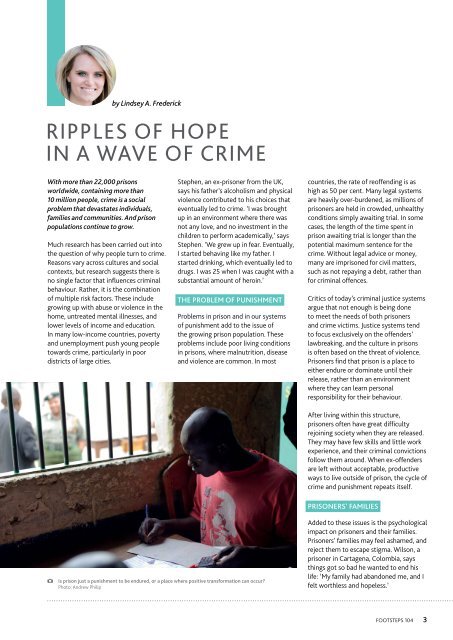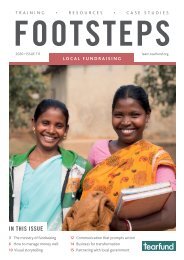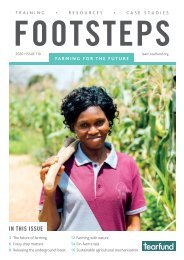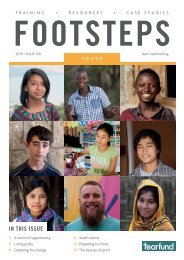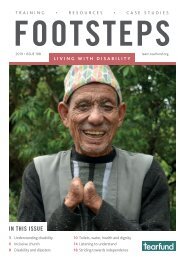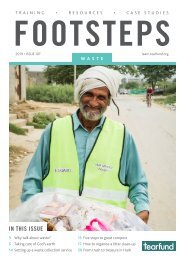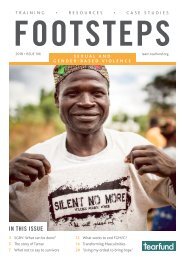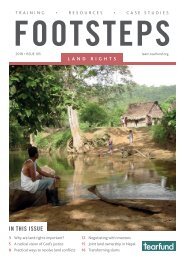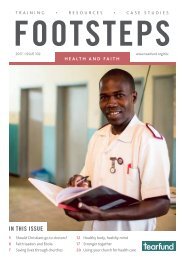Footsteps 104: Prisons
Footsteps 104 features practical tips for getting involved in prison ministry and caring for ex-offenders.
Footsteps 104 features practical tips for getting involved in prison ministry and caring for ex-offenders.
Create successful ePaper yourself
Turn your PDF publications into a flip-book with our unique Google optimized e-Paper software.
y Lindsey A. Frederick<br />
RIPPLES OF HOPE<br />
IN A WAVE OF CRIME<br />
With more than 22,000 prisons<br />
worldwide, containing more than<br />
10 million people, crime is a social<br />
problem that devastates individuals,<br />
families and communities. And prison<br />
populations continue to grow.<br />
Much research has been carried out into<br />
the question of why people turn to crime.<br />
Reasons vary across cultures and social<br />
contexts, but research suggests there is<br />
no single factor that influences criminal<br />
behaviour. Rather, it is the combination<br />
of multiple risk factors. These include<br />
growing up with abuse or violence in the<br />
home, untreated mental illnesses, and<br />
lower levels of income and education.<br />
In many low-income countries, poverty<br />
and unemployment push young people<br />
towards crime, particularly in poor<br />
districts of large cities.<br />
Stephen, an ex-prisoner from the UK,<br />
says his father’s alcoholism and physical<br />
violence contributed to his choices that<br />
eventually led to crime. ‘I was brought<br />
up in an environment where there was<br />
not any love, and no investment in the<br />
children to perform academically,’ says<br />
Stephen. ‘We grew up in fear. Eventually,<br />
I started behaving like my father. I<br />
started drinking, which eventually led to<br />
drugs. I was 25 when I was caught with a<br />
substantial amount of heroin.’<br />
THE PROBLEM OF PUNISHMENT<br />
Problems in prison and in our systems<br />
of punishment add to the issue of<br />
the growing prison population. These<br />
problems include poor living conditions<br />
in prisons, where malnutrition, disease<br />
and violence are common. In most<br />
countries, the rate of reoffending is as<br />
high as 50 per cent. Many legal systems<br />
are heavily over-burdened, as millions of<br />
prisoners are held in crowded, unhealthy<br />
conditions simply awaiting trial. In some<br />
cases, the length of the time spent in<br />
prison awaiting trial is longer than the<br />
potential maximum sentence for the<br />
crime. Without legal advice or money,<br />
many are imprisoned for civil matters,<br />
such as not repaying a debt, rather than<br />
for criminal offences.<br />
Critics of today’s criminal justice systems<br />
argue that not enough is being done<br />
to meet the needs of both prisoners<br />
and crime victims. Justice systems tend<br />
to focus exclusively on the offenders’<br />
lawbreaking, and the culture in prisons<br />
is often based on the threat of violence.<br />
Prisoners find that prison is a place to<br />
either endure or dominate until their<br />
release, rather than an environment<br />
where they can learn personal<br />
responsibility for their behaviour.<br />
After living within this structure,<br />
prisoners often have great difficulty<br />
rejoining society when they are released.<br />
They may have few skills and little work<br />
experience, and their criminal convictions<br />
follow them around. When ex-offenders<br />
are left without acceptable, productive<br />
ways to live outside of prison, the cycle of<br />
crime and punishment repeats itself.<br />
PRISONERS’ FAMILIES<br />
Is prison just a punishment to be endured, or a place where positive transformation can occur?<br />
Photo: Andrew Philip<br />
Added to these issues is the psychological<br />
impact on prisoners and their families.<br />
Prisoners’ families may feel ashamed, and<br />
reject them to escape stigma. Wilson, a<br />
prisoner in Cartagena, Colombia, says<br />
things got so bad he wanted to end his<br />
life: ‘My family had abandoned me, and I<br />
felt worthless and hopeless.’<br />
FOOTSTEPS <strong>104</strong><br />
3


